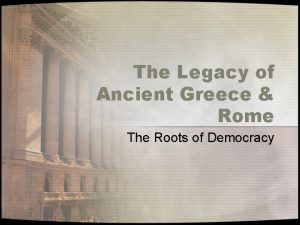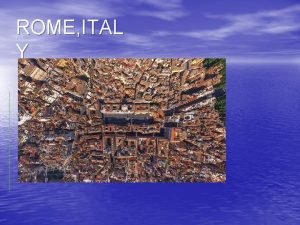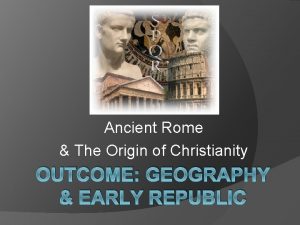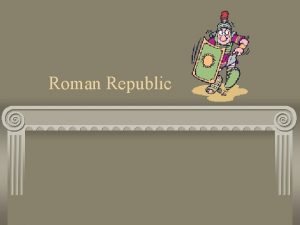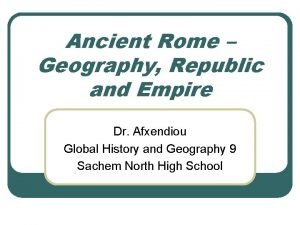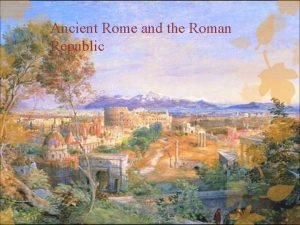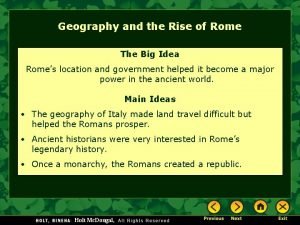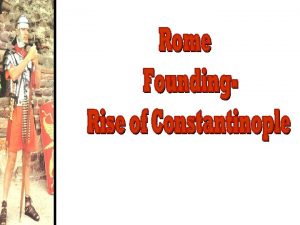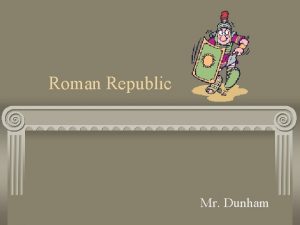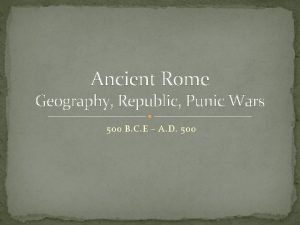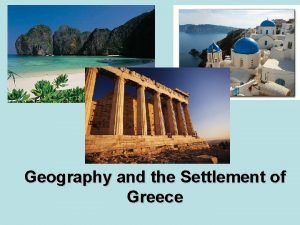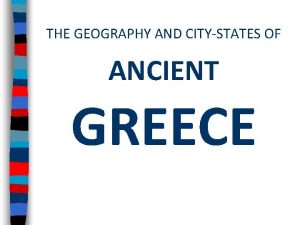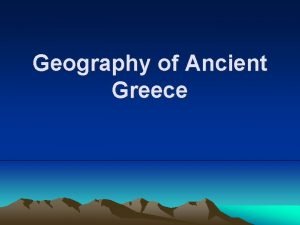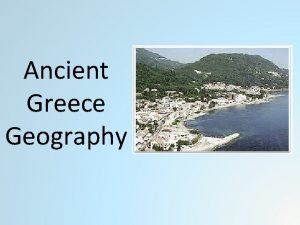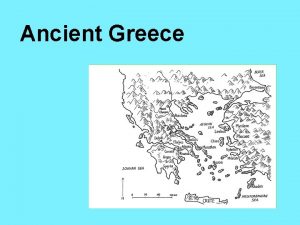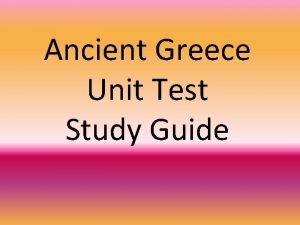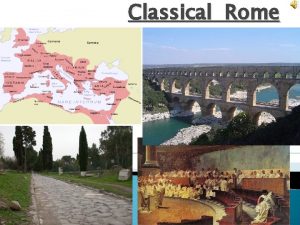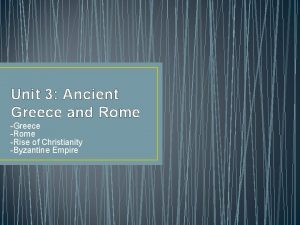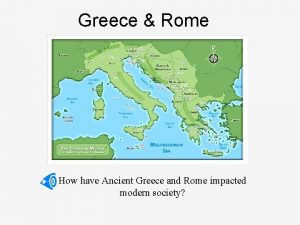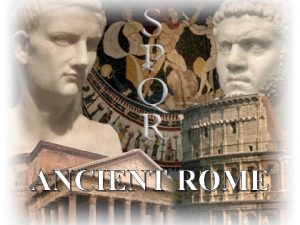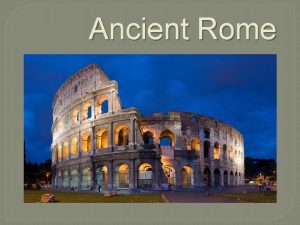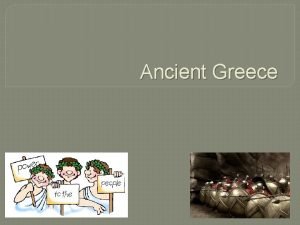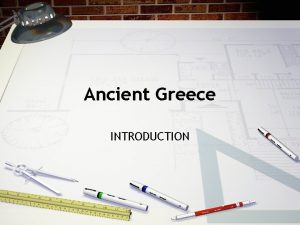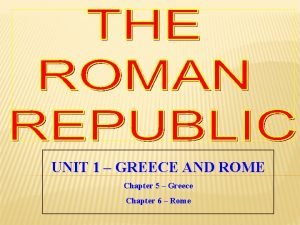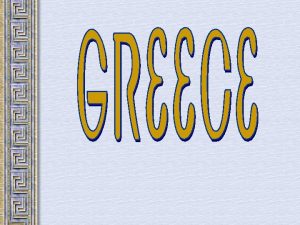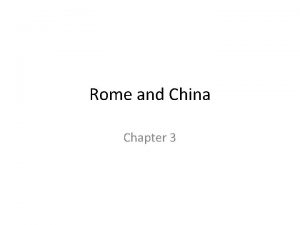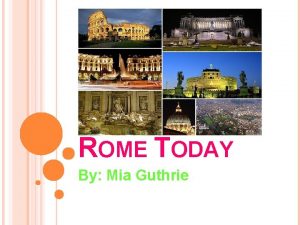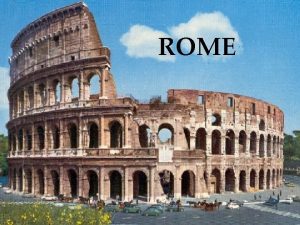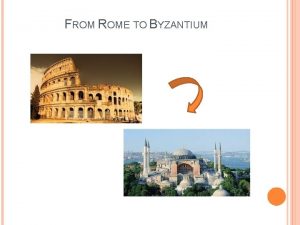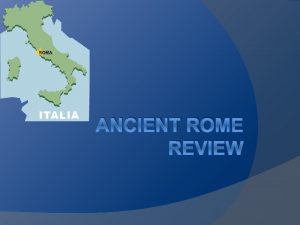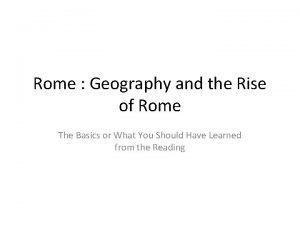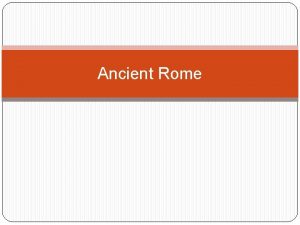UNIT 3 GREECE AND ROME Geography of Greece
































- Slides: 32

UNIT 3 GREECE AND ROME

Geography of Greece � � � Consisted of a large mountainous peninsula and a system islands Forced Greeks to trade throughout the Mediterranean Exposed to alphabet, and writing system of Phoenicians

Early Greek Civilization � � Greek civilization was heavily influenced by Minoan—writing, shipbuilding Mycenae—bronze Dorians--copper

The Rise of Greek City-States � � � Mountains and seas caused Greek populations to be cut off leading to city-states Each city-state (polis) developed its own govt and laws, but kept Greek culture Greeks were polytheistic (Zeus, Athena), celebrated gods with Olympic games every four years

Sparta and Athens � � � Sparta began as a slave (helots) city-state Organized around military needs, at an early age males were taught to serve the state as soldiers Individualism and new ideas were discouraged Athens city-state developed the first democracy (rule of the people), and all citizens could vote and participate in govt Citizens assembly was main governing body, made laws, foreign policy, and even had council, jury and magistrate positions Women, foreigners, and slaves were not citizens and could not participate (vote or serve) in Athenian democracy

Golden Age of Greek Culture Began after Greek victory in the Persian wars, and led to many achievements � Philosophy—Greeks believed reason was powerful enough for an individual to understand the world and solve its problems --Philosophers (Socrates, Plato, Aristotle) began to question nature and life � Art and Architecture— Greeks designed buildings and statues with ideal proportions Parthenon—the high point of Greek architecture (columns) � http: //www. youtube. com/watch? v=fw. Y Yx. VGs. S 0 E&feature=plcp

Golden Age of Greek Culture Science and Mathematics --Erastosthenes showed the Earth was round and calculated its circumference, invented sieve --Archimedes , studied levers, pulleys, and measured volume and density --Pythagrous advanced the study of geometry � Literature and History --Greeks developed the first known dramas and historical writings �

Plato’s--Crito � “Look at it this way. Suppose that while we are preparing to run away, the laws and Constitution of Athens were to come and ask: “Now Socrates what are you doing? Can you deny that by this act you are thinking of, you will have the power to destroy us, the laws, and the whole state as well? Do you imagine that a city can continue to exist and not be turned upside down, if the legal judgments pronounced have no force and are destroyed by private persons? You have 70 years in which you could have left the country if you were not satisfied with us or felt the agreements were unfair. And now, after all of this, are you not going to stand by your agreement” What reasons does Socrates give to his students for his refusal to escape? Would you have agreed with his reasoning? Explain your answer.

Aristotle’s---Politics � “We have next to consider how many forms of government there are, and what they are…The true forms of government are those in which the one, the few or the many govern with a view of the common interest…of forms of government in which one rules, we call that kingship: that in which more than one but not many rule, we call aristocracy: when citizens at large administer that state for the common interest, the government is called a democracy. ” � What three types of government does Aristotle identify? How do they differ?

Peloponnesian Wars (432 BC— 404 BC) � � 30 year war between Athens and Sparta, Sparta emerges victorious, Athens destroyed War greatly weakens the Greek city-states

Women in Greece � � � Women in Greece were regarded as inferior and excluded from public life Athenian women could own slaves, but not land Spartan women could be educated and enjoyed greater status

Alexander the Great � � King of Macedonia who conquers Greece, Egypt, Persia and all territory to the Indus River Valley Alexander spread Greek culture through his empire but also absorbed Eastern ideas and customs

Alexander the Great Hellenistic Culture—fusion of Greek and Eastern cultures --leads to achievements in learning and scholarship throughout the known world --centered at library in Alexandria Egypt �

THE ROMAN EMPIRE

Geography of Rome was built on a fertile plain in the middle of Italy --mountains to the north, and sea to the west and east provided protection and trade �

Roman Culture � � Rome was the heir to the Greek civilization Used Greek gods, but changed names according to their language Latin

Roman Republic � � � Early Romans developed a republican form of government, based on elected representatives and the “rule of law” A republic is a system of government by elected representatives Romans had two main social classes: Patricians (wealthy landowners) and Plebeians (farmers) Governed by Senate and Consuls, tribunes spoke for the people

Twelve Tables � � � Twelve Tables—Roman code of laws that stated that citizens were “equal under the law” and “innocent until proven guilty” Legal Process—promoted justice (trials, appeals) Contract --(idea of private agreement that govt can enforce)

Twelve Tables

Rome expands to an Empire � � � Rome unifies Italy, it defeats Carthage (Punic Wars) and spreads to Western Europe becoming an empire. Augustus Caesar (1 st emperor) had monarch like powers Roman emperors expanded Rome’s frontiers and were seen as godlike

Pax Romana (Roman Peace) 27 BC — 395 AD � � � Period of long peace in Roman empire Rule of good emperors, and traditions of law allowed for Pax Romana Roman engineers used concrete to develop extensive road system for trade, military and communication uses Rome’s well developed army expands empire Colosseum is built to provide games to the masses

Imperial Roman Road System

Women in Rome � � � Marriage, family, and home were important to Romans, led to better treatment of women Men represented the family and had the authority Women were responsible for the household, but could work outside the home or own property

The Jewish Diaspora � � Rome permitted different religions in the empire, as long as emperor was seen as god Jews refused which led to Roman destruction of Jerusalem and spread of Jews into Europe

Christianity � � Based on the teachings of Jesus, who taught forgiveness, mercy and sympathy for poor After death of Jesus, apostles spread his message of an afterlife for all believers Romans persecute Christians, but faith’s simple message and lack of strict rules or laws helps it spread Emperor Constantine converts to Christianity and proclaims freedom of worship, later becomes official religion of Rome

The Spread of Christianity

Christian Beleifs � � � Role of Jesus—represents the son of God, his death saves humankind from punishment from sins Christian Conduct—believed they will be saved and go to heaven if they have faith in Christ and treat others with love and respect Christian Bible—Sacred Book of Christianity, Old Testament (Jewish Bible), New Testament (life of Jesus and Apostles)

The Fall of the Roman Empire � � Political Weakness—ineffective or corrupt emperors Economic Problems—high costs lead to high taxes, which lead to inflation and unemployment Military decline—Paid soldiers instead of Roman citizens are less loyal Invasions—Barbarian invasions along all edges of the empire (Goths/Huns)

Barbarian Invasions:

The Fall of the Roman Empire � � � In 284 AD empire is divided into East and West to make it easier to manage In 476 AD Rome is sacked and last emperor is overthrown Eastern Empire (Byzantine) survives

The Legacy of Rome � � � Law--Roman law concepts influenced later European legal systems Language—Latin was the language of Rome influences other European languages Engineering—Developed concrete, bridges, aqueducts, arch and dome. Built large road system across empire Christianity—adoption by Roman empire allows it to spread http: //www. youtube. com/watch? v=me 4 E 5 w. DC K 2 Q&feature=plcp

Graphic Organizer Greece Rome Characteristics: Achievements:
 Myths of greece and rome
Myths of greece and rome The glory that was greece and the grandeur that was rome
The glory that was greece and the grandeur that was rome Athenians physical education
Athenians physical education The legacy of ancient greece and rome
The legacy of ancient greece and rome The geography of rome
The geography of rome Ancient rome outcomes geography and early republic
Ancient rome outcomes geography and early republic Babylon medo-persia, greece rome timeline
Babylon medo-persia, greece rome timeline Rome's geography
Rome's geography Roman republic geography
Roman republic geography Rome geography
Rome geography Roman republic geography
Roman republic geography Physical geography of rome
Physical geography of rome 750 bce
750 bce Location
Location Ancient rome geography
Ancient rome geography Geography and the settlement of greece
Geography and the settlement of greece Ancient greece geography
Ancient greece geography Ancient greek map
Ancient greek map Greece geography
Greece geography Physical geography greece
Physical geography greece Describe the geography of ancient greece
Describe the geography of ancient greece About 80 percent of the geography of greece is
About 80 percent of the geography of greece is Unit 10, unit 10 review tests, unit 10 general test
Unit 10, unit 10 review tests, unit 10 general test Frq format ap human geography
Frq format ap human geography 5 themes of geography ap human geography
5 themes of geography ap human geography Proruption ap human geography
Proruption ap human geography Unit 6 aviation geography and terminology
Unit 6 aviation geography and terminology Ancient greece unit test
Ancient greece unit test Mathematical location ap human geography
Mathematical location ap human geography Economics unit 2 lesson 1
Economics unit 2 lesson 1 Temperate region
Temperate region Unit 5 geography challenge answer key
Unit 5 geography challenge answer key Folk culture ap human geography
Folk culture ap human geography



